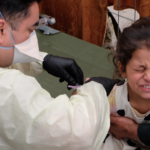New blood: Civil society helps shape the 2011 BTWC Review Conference agenda
By Malcolm Dando | September 23, 2010
The Chemical Weapons Convention (CWC) and the Biological and Toxin Weapons Convention (BTWC) have evolved in interestingly different ways in the first decade of the twenty-first century. The CWC and its major international organization — the Organization for the Prohibition of Chemical Weapons — have become rather opaque to civil society, despite a significant program of official activities.
It was made clear that while NGOs can help to develop appropriate methods and best practices, much stronger state-level action would have to be agreed upon in 2011 to significantly change the present low level of awareness among life scientists.
On the other hand, the BTWC — after the failure of its member states to agree on a verification system and an associated major international organization in 2001-02 — has taken to involving many civil society organizations each year in its two annual meetings at the United Nations in Geneva. I attended the first set of 2010 meetings, the BTWC’s Meeting of Experts, in August.
At these meetings, it was particularly impressive that diplomats from states parties to the BTWC were willing to take part in seminars put on by various non-governmental organizations (NGOs) between the official sessions. Moreover, many diplomats also followed a review of each day’s events produced by the BioWeapons Prevention Project (BWPP), a coalition of NGOs.
At the very least, it seems to me that this activity is likely to lead eventually to a much greater involvement by life scientists in preventing misuse of their work. At one point, NGOs were invited to talk about how to help states parties in the event they are the target of a biological weapons attack. Their statements repeatedly expressed the view that in any outbreak of disease — whether natural, accidental, or deliberate — scientists were likely to be at the forefront and must be extremely well educated about biosafety and biosecurity.
The BWPP also circulated a questionnaire to delegates asking them to indicate which five of eighteen topics they thought were most important for consideration at the 2011 BTWC Review Conference. The intention of BWPP was then to organize a discussion by civil society organizations about the most frequently chosen topics.
Of course, other relevant international organizations attend these meetings. The World Health Organization (WHO), for example, organized a workshop on the important issue of the International Health Regulations.
Three papers were presented at an NGO lunchtime seminar under the general title of “Preparing for the 2011 BWC Review Conference.” These review conference papers were the first in a new collection intended to raise some of the key issues that would necessarily be discussed in 2011, such as how to better monitor and assess the rapid advances in the life sciences.
During a seminar entitled “Strengthening the Prohibition through Education: Experiences, Resources and Models” organized by the University of Exeter and the Inter-Academy Panel (a grouping of the world’s national scientific academies) a wide range of organizations presented their experiences in attempting to raise the level of awareness among life scientists about the BTWC and their responsibilities toward the convention. A book containing contributions from the presenters was also distributed.
It was made clear that while NGOs can help to develop appropriate methods and best practices, much stronger state-level action would have to be agreed upon in 2011 to significantly change the present low level of awareness among life scientists.
One lunchtime seminar focussed on “Synthetic Biology: Engineering a Safer Future” (see last month’s column). Speakers included Jane Calvert of the University of Edinburgh; Markus Schmidt of the Organization for International Dialogue and Conflict Management; and Eleonore Pawels of the Woodrow Wilson International Center. They ranged widely and informatively in their presentations from the nature of this field to the public’s perception of what is happening and the media’s treatment of the subject — both good and bad.
For me, however, the highlight of this meeting’s NGO seminars came when Barry Kellman, president of the International Security and Biopolicy Institute, together with two colleagues, presented personal views of what the 2011 BTWC Review Conference might best do in regard to Article VII of the convention on assistance to a state party that “has been exposed to danger as a result of a violation of the Convention.”
The presentations went into considerable detail about the need for advanced planning and international cooperation before any bioweapons attack took place. Kellman, a lawyer, set out six complex issues that need sorting out. These included legal barriers to sharing disease surveillance, inconsistent forensic standards for diagnosis, and legal disincentives to developing new investigative capacities. Kellman hoped that the review conference could agree to set up a special legal task force to deal quickly and effectively with these issues.
I presented the Bradford Review Conference Paper on “An Annual Meeting for the [BTWC]” because the author, Nicholas Sims of the London School of Economics, was unable to make the meeting. Nicholas has long argued that the convention has a severe and debilitating institutional deficit, with fewer than 10 people in its Implementation Support Unit, and with decisions made only every five years at the review conferences. It seemed to me that even if Kellman’s proposed task force could be set up, implementing its recommendations would be extremely difficult within the present organizational structure.
A questioner pointed out that even getting such a task force agreed under Article VII would eat up much of the small amount of time available at the review conference. Moreover, the kind of issues raised were surely more immediately relevant to the WHO, which would inevitably be involved in dealing with any serious outbreak; at the upcoming review conference, more important issues need to be addressed, such as increasing the assurance of state parties’ compliance with their obligations. I must say I agreed with the questioner. The processes involved in the development of the convention have needed rebalancing toward the issue of compliance for the last decade.
Where I did agree with Kellman was in his lively introduction to the seminar when he stressed how the successive review conferences of the BTWC since 1980 have shaped the ongoing evolution of the convention and that next year’s review conference will be crucial in updating it, given the rapid advances being made in the life sciences.
I think also that civil society has done enough over the last decade to have some impact in what actually is agreed at the 2011 BTWC Review Conference. The question now is: Can civil society put its views forward in a clear and consistent manner before the review, when it is most likely to have some effect? I look forward over the next months to BWPP’s organized discussion of the topics highlighted in the responses to its questionnaire.
Together, we make the world safer.
The Bulletin elevates expert voices above the noise. But as an independent nonprofit organization, our operations depend on the support of readers like you. Help us continue to deliver quality journalism that holds leaders accountable. Your support of our work at any level is important. In return, we promise our coverage will be understandable, influential, vigilant, solution-oriented, and fair-minded. Together we can make a difference.
Topics: Biosecurity, Columnists















